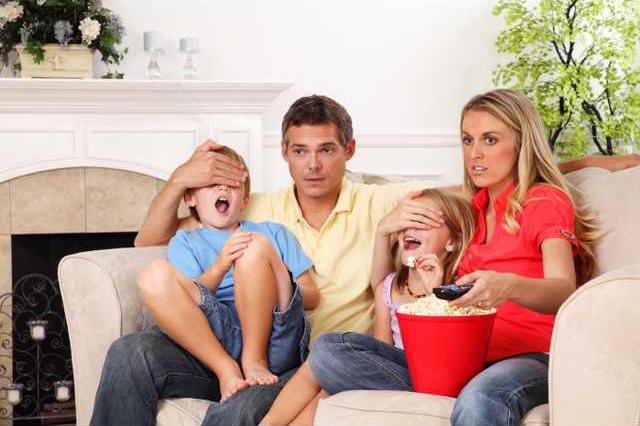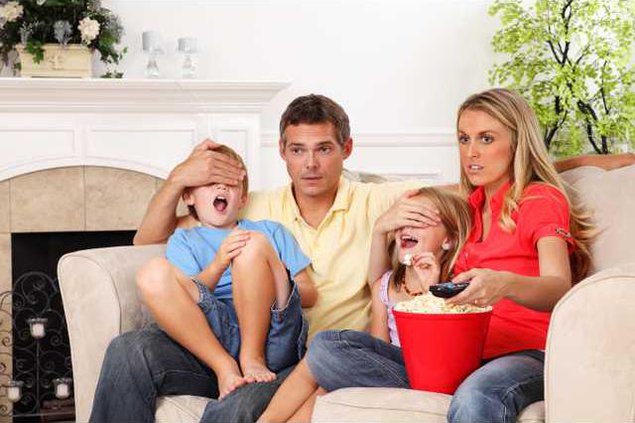Parents planning on a night in with the latest R-rated film after the kids go to bed might want to put down the remote and read Dr. Dan Romer's latest research first.
Romer is the director of the Adolescent Communications Institute at Annenberg Public Policy Center, and this week he published a study that found that adults become dramatically desensitized to sex and violence in movies rapidly — and it affects their ideas about movie ratings and appropriate viewing ages for children.
Participants in Romer's study watched six clips from violent or sexualized movies like "Terminator: Salvation," "Taken 2" and "Casino Royale" and were then asked a series of questions about what they thought the film was rated and what age children should be allowed to see it.
In just 20 minutes, participants went from saying sex and violence was only appropriate for 17 or 18-year-olds down to 14 years old five video clips later.
"The more they watched, the less concerned they became (about viewing ages for kids)," Romer said. "And sex and violence acceptance seemed to transfer easily — as in, if they saw a clip with a lot of sex first, that seemed to make them more accepting of violence and vice versa."
Romer says his research is proof that the American film ratings system needs an overhaul.
"Clearly, our system needs to change," Romer said. "There are parents on the MPAA ratings board. It's hard to imagine they're not being affected, too."
Ratings creep
Romer believes his research illustrates a growing problem in the movie industry where content once reserved for an R rating has trickled into the PG-13 category.
Romer calls this phenomenon "ratings creep," and his claims are supported by related 2013 research at Annenberg and at the University of Pennsylvania. Both of those studies found that R-rated and PG-13 films shared similar amounts of violence, sex, substance use and that gun violence in PG-13 movies has nearly tripled since 1985.
"This is a movie industry problem," Romer said. "They need to reach the widest audience possible, so they make action movies that can get PG-13 ratings. The problem is that they can kind of game the ratings system."
This summer, Sylvester Stallone won a fight to get a PG-13 rating for the violent third installment of "The Expendables" franchise in order to "reach as many people as possible," Stallone said. But Cinemablend's Gabe Toro argued that the film leveraged the PG-13 rating for one reason: Money.
"Not only is PG-13 specifically financially driven, dedicated to protecting no one from anything, but it's outdated," Toro wrote. "It's a decision created to make money, to water down films so that 'The Expendables 3' could be the same movie for a kid that it is for an adult."
Romer's idea of ratings creep might be the reason behind a trend cinema and family therapist Lisa Bahar sees in her practice.
"What I see is the behavior of youth and heroes gravitating to are more aggressive than in prior generations," Bahar said. "I don’t think the parents are coming forth about (exposure to media violence) as much as we would hope."
That's because people become desensitized without realizing it, Bahar said, just as the participants in Romer's study did. Bahar thinks of much of the blame should go to the movie industry and the media.
"The media is so powerful and this is a tricky, insidious way people become desensitized without realizing it," Bahar said. "There's never a rule book that comes with raising a child. Yeah, you could argue that a parent is responsible for their own child, but you have to remember that the child is part of a system that’s outside of the home."
Parents can start addressing that system by demanding an updated movie ratings system, Romer said.
"The industry has found a way to create these kinds of violent films that works for them," Romer said. "It's time we consider a third-party rating system."
Cultural change at home
Psychologist Jim Taylor says that while the film industry might be responsible for the content that desensitizes parents and kids, it's no use expecting the business to change.
"Culturally, this isn't going to change," Taylor said. "Everything in our culture is driven by money. And the two most reliable sources of entertainment money are sex and violence."
Taylor says Romer's research is unsurprising, especially since movies are only one example of how parental behavior can have implications for kids.
"What happens even in private time can seep through," Taylor said. "You also see it with technology use. The relationship that parents have with technology is often the relationship that children will have with technology."
If parents really want to protect themselves and their kids, Taylor said, some drastic changes may have to be made in the home.
"It means severely limiting their exposure to unhealthy forces (like violence or sex)," Taylor said. "Parents need to recognize that viewing sex and violence will change their attitude toward it with respect to their kids."
That also means knowing what kids are watching on services like Netflix, where kids have the potential to watch movies and TV with any rating unless supervised. Thanks to Romer's research, Taylor says putting kids' well-being first means parents must look harder at their own watching habits whether the kids are in the room or not.
"This is a family issue because parents can make choices about what they expose themselves to," Taylor said. "They have to choose their children over watching this kind of entertainment."
Email: chjohnson@deseretnews.com
Twitter: ChandraMJohnson
When parents are desensitized, what does that mean for kids?





